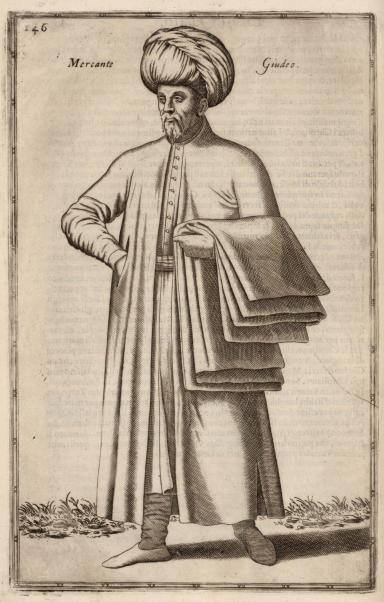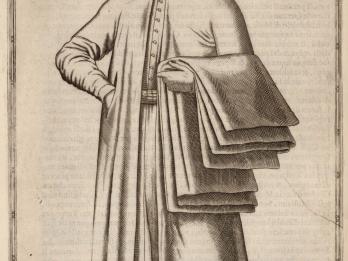Divre rivot (Words of Contention)
Nicolas de Nicolay
Isaac Adarbi
Mid–16th Century
The following incident occurred: On the holy Sabbath of ḥol ha-mo‘ed Passover in the year 5335 [1575], many virtuous individuals from the Lisbon congregation arose and came to an agreement among themselves, through a vote, to release themselves from an obligation they had undertaken several years earlier. This obligation was to observe anything decreed upon them by the “seven bright shining lights,” that is, the nobles and princes, So-and-So and So-and-So. This applied to their commands concerning the appointment of elders of the aforementioned congregation, or treasurers, or appraisers, or representatives, or members of the synagogue board, or any other similar congregation functions. They accepted upon themselves, with the severity of an excommunication, ban, and ostracism, to guard and fulfill all that these seven would impose upon them for the duration of ten years. It was also written in that document of consent: We, the undersigned, all swear to observe and perform everything that is written, etc.
Now, those individuals from that congregation, who were bound by the force of that agreement, have voted to absolve themselves from it. Their agent stood up and rose to the platform, in the midst of the whole congregation, in front of a packed hall, and declared, “You should know, gentlemen, regarding the agreement which we accepted upon ourselves, to obey the orders of those seven, we have now agreed to release ourselves from that obligation. It is hereby nullified and akin to a broken shard of earthenware, a worthless item.” All the members of the congregation simply stood silently; no one uttered a word.
When those individuals saw that the agreement was remitted, they came together on that Sabbath afternoon, and selected their own elders, leaders, and representatives to instruct and guide the congregation in the manner and custom of all congregations of the diaspora. Their agent arose in the midst of the congregation and announced and publicized those appointments, so that the whole congregation should know who had been selected as their elders and leaders, and nobody issued any objection.
On the following morning, six of the nobles and princes—as one of the seven had been absent from the city for several days—gathered together, along with a few virtuous individuals from the congregation, and complained that those people who had chosen the congregation elders without the consent of that seven had acted illegally, for they had broken their word as formulated in that agreement. Accordingly, those nobles sent for me, and I came before them and heard their complaint and I saw the text of that agreement. “Then said I: Behold, I have come, and in the scroll of a book it is written about them” [see Psalms 40:8]. However, it is necessary to hear what they have to say; and what one will answer the messengers of the nation (Isaiah 14:32).
They proceeded to call two or three of those select members of the congregation, and I read before them the whole text of the agreement. They responded that they had indeed given their consent as written, but the intent of the agreement was to amend, improve, and guide the congregation leadership, so that all this people shall go to their place in peace (Exodus 18:23). They added that this is also indicated by the wording of the agreement, which states that from peace arise the issues of life, etc. (Proverbs 4:23), and our brothers answered us with peace, etc.
They argued as follows: Now, we ourselves can see how this agreement has become like a deceitful bow (Psalms 78:57), as a great war and division threatens to emerge from it. This has come about because they have been oppressed and burdened with taxes and levies and other troubles, and they have no power to have their voices heard. For the seven princes have subjugated them like people sold into slavery. They would say that once they have decided upon something, they will not change their minds on account of criticisms. Furthermore, as they were powerful individuals, they took no notice of the ordinary people, to the extent that the poor of the congregation were ignored, both in their joys and their sadness. None would accompany their dead—once it was announced in the congregation that a certain person had passed away, they had to hire someone to carry his body to the cemetery. In general, none of the standard edicts of Jewish congregations were enacted, until it could be said that although every congregation in the world appoints elders to lead its members and to attend to their needs, suits, and business claims, in this congregation there is nobody who leads us and watches over us, or helps us in our litigations and claims. Thus, the congregation is like a flock without a shepherd [see Numbers 27:17]. There are many more such problems, too numerous to detail, as every single member of the congregation complains against them.
Consequently, we voted and decided to nullify the aforementioned agreement, and to act like all Jewish congregations in the diaspora—to appoint elders and officials and representatives who will provide leadership and guidance for the congregation for a limited period. This is the manner of all congregations, that after their leaders and representatives have served the people and their time is over, other elders and representatives are appointed; some of them are wealthy, others are middle-class, while yet others are poor. As stated, this is the custom in all congregations, as it ensures that all of its members will have someone to look after their needs, and perform for them the commandments of lovingkindness with both the living and the dead. The people cannot bear to be treated as slaves, who have a mouth and yet cannot speak [see Psalms 115:5], due to those seven nobles. For the verse states that they are My slaves (Leviticus 25:42) and not slaves of slaves [b. Bava Meẓi‘a 10a].
In addition, some of those who signed the agreement now contend that they accepted the oath under duress, and they were absolutely forced to swear, against their will, and they disputed the terms at the time.
I sought with all my powers of persuasion to rectify the situation, so that the parties could come to a settlement and avoid a bad outcome. I argued that the agreement was rock solid, as it had been accepted under the decree of excommunication, ban, and ostracism, and by an oath of the Torah. Furthermore, how dare they announce the appointment of their own elders and representatives, in opposition to the enactment and edict of that agreement? They do not have the authority to do so, and they are committing a severe transgression, God forbid. They answered that they have already absolved themselves of the agreement in the presence of the whole congregation, with great ceremony, and no dissent was voiced.
Credits
Published in: The Posen Library of Jewish Culture and Civilization, vol. 5.





